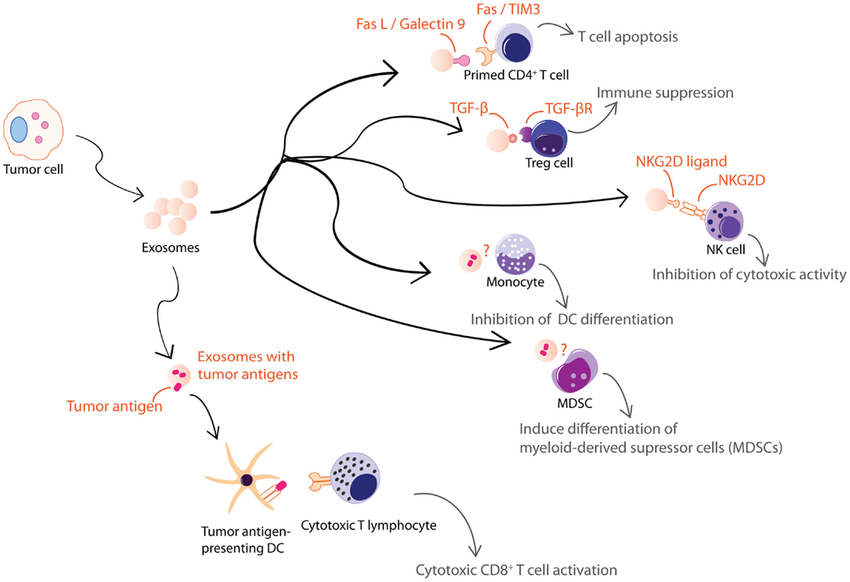Tumor Cell-derived Exosomes (TEX)-based Vaccines
During the past years, exosomes have been used as vaccines against various pathologies, as they contain antigens associated with a given disease, e.g., cancer. Based on years of experience and advanced technology platform, Creative Biolabs is committed to the development of exosomes-based vaccines to facilitate the treatment of various immune-related diseases, especially for cancer immunotherapy. Now, we are happy to introduce the current situation of tumor cell-derived exosomes (TEX)-based vaccines development to global clients.
Introduction of Tumor Cell-derived Exosomes (TEX)
Tumor cell-derived exosomes (TEX) are exosomes produced and released by cancerous cells. They are ubiquitously present in body fluids of patients with cancer. Importantly, TEX carry unique genetic and molecular cargos and thus can be distinguished from extracellular vesicles (EVs) derived from normal cells. Like other EVs, TEX move freely in numerous tissues and thus can be viewed as a communication system between tumor and normal cells, including immune cells. Upon contacting targeted recipient cells, TEX carrying a cargo of multiple molecular species, including nucleic acids, deliver their content and modify functions of recipient cells. Moreover, studies have reported that TEX have the ability to suppress functions of immune cells either directly by delivering suppressive signals/ molecules to activated lymphocytes or indirectly by promoting expansion and activity of regulatory T cells.
 Fig.1 Tumor cell-derived exosomes can be either immune suppressive or activating.1,2
Fig.1 Tumor cell-derived exosomes can be either immune suppressive or activating.1,2
Advantages of Tumor Cell-derived Exosomes (TEX)-based Vaccines
Exosomes interact extensively with cells of the immune system, and prime the immune system to recognize and kill cancer cells. It has been reported that TEX contain tumor antigens, and they are able to stimulate cells of the immune system and reduce tumor growth. Studies have shown that TEX expressing heat shock protein-70 (Hsp70) which function as endogenous danger signal, promote NK activation and tumor cell lysis through granzyme B release. It has also been shown that heat-shocked TEX are more efficacious than TEX alone, as it confers a greater immunogenicity and elicits a greater immune response, thereby potentially making it a more effective cancer vaccine. Furthermore, apart from stimulating the adaptive immune system by cross-priming cytotoxic T cells, it has also been demonstrated that TEX can activate the innate immune system by increasing IgG antibody response and NK cells.
TEX are critical components of an intercellular information network between the tumor and the host. During the past, TEX-based vaccines have been widely used for the treatment of tumor. Except for TEX-based vaccine, dendritic cell-derived exosomes (DEX)-based cancer vaccines and ascetic cell-derived exosomes (AEX)-based vaccines have also been developed for immunotherapy.
References
-
Zhang, B.; et.al, Immunotherapeutic potential of extracellular vesicles. Frontiers in immunology. 2014, 5:518.
-
under Open Access license CC BY 4.0, without modification.
For Research Use Only. Cannot be used by patients.
Related Services:

 Fig.1 Tumor cell-derived exosomes can be either immune suppressive or activating.1,2
Fig.1 Tumor cell-derived exosomes can be either immune suppressive or activating.1,2









